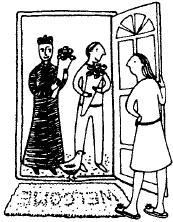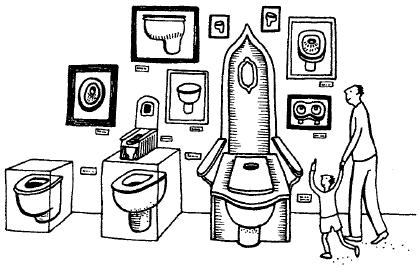
Priests, cousins and pigeons. The first two are not good to marry. The last two only make the house dirty

‘Choose the neighbour before the house’ goes an old Syrian proverb; and it’s as well to check out the people living nearby before you move in:
kwarts-idioot (Dutch) next door to an idiot
espreitadeira (Portuguese) a woman who spies on her neighbours
geitonopoulo/a (Greek) the boy/girl next door
buurvrouw (Dutch) a neighbour’s wife
búa-grettur (Old Icelandic) a quarrel between neighbours
keba (Myanmar) a village reserved for outcasts and beggars
If you have space and time, and hopefully some good materials, your best bet is probably to build your own:
u’skwææi (Mingo, USA) a brick (literally, cooked stone)
skvorets (Russian) a person transporting building materials to a dacha in a car (literally, a starling – with reference to nest building)
méygirathu (Tamil) to cover a house with grass, leaves, etc.
maaia (Yamana, Chile) to build wigwams here and there, as a large number of people flocking to a place will do rather than crowd into two or three existing wigwams
Things always work out better if you’ve got people to help you:
akittlttuq (Iñupiat, Inuit) a stitch used for sewing a tent made by having one person on the inside while the other is outside (the one on the inside pushes the needle out so that the other person can pull the thread through; the person on the outside then pushes the needle in for the other person to pull); the same stitch is used for sewing a window into place
dugnad (Norwegian) working together in everyone’s interest without getting paid (for example, moving into a house, painting, building a cabin, etc.; also applies to parents coming together to paint a kindergarden, or everyone in an apartment building cleaning inside and outside the house together)
imece (Turkish) a social gathering at which everyone pitches in to help a neighbour undertake a large task
abort (German) Iavatory
bang (Korean) room
dig (Gaelic) ditch
sir (Arabic) crack of the door
street (Norwegian) gate
rub (Croatian) edge
In Surinam, when the main roof beam of a new house is in place they have a celebration they call opo-oso, at which a flower or flag is nailed to the end of the beam, some beer is sprayed on the front of the building and then the builders, owner and others have a drink to celebrate.
The Dutch have two useful expressions: kneuterig describes a particularly bourgeois type of stinginess which someone might display if they spent a fortune buying a new house and then furnished it with the cheapest fittings available, all in the name of saving money; and its opposite een vlag op een modderschuit, excessive decoration of a common thing, or trying to make the ugly beautiful (literally, a flag on a mud barge).
It is an increasingly common practice to transliterate foreign proper nouns into Chinese characters that sound similar to the original word but give the Western name a highly positive connotation to Chinese ears:
| adian | Athens | proper law |
| zhili | Chile | wisdom benefit |
| deli | Delhi | virtue hometown |
| faguo | France | method country |
| henghe | Ganges | everlasting river |
| haiya | The Hague | sea tooth |
| ingguo | England | country of heroes |
| lundun | London | matching honest |
| meiguo | America | beautiful country |
| niuyue | New York | bound agreement |
| taiguo | Thailand | Peaceful country |
The Germans have the wonderful word Gemütlichkeit for that particular quality of cosiness you can only ever feel at home. In that always-descriptive language, someone who prefers to stay at home is a Stubenhocker, literally, a room sitter; and in the end, however splendid the house, it’s our intimate individual eyries we actually spend our time in:
pung (Iban, Sarawak and Brunei) to keep to one’s room
sucilwa (Mambwe, Zambia) a man who never leaves his hut (literally, all smoked up)
kúpa-mand úka (Sinhala, Sri Lanka) one who never leaves his home, one ignorant of the world (literally, a frog in a well)
Different cultures have very different approaches to what we euphemistically call the smallest room in the house. The Spanish have excusado, with its polite suggestion of excusing yourself, whereas the German term wo sogar der Kaiser von China allein hingeht literally means ‘where the emperor of China goes by himself.’ Once there, though, we all go through the same motions:
engkilu’ (Iban, Sarawak and Brunei) sticks or leaves used as toilet paper
zasedat’ (Russian) to sit on the toilet for a long time (literally, to preside)
Some insist on trying to make us forget why we’re there at all:
toirebijutsukan (Japanese) a trend whereby young women moving into an apartment alone for the first time will go to extreme lengths to decorate their lavatory, scent it with perfume and stock it with interesting literature (literally, toilet museum)

We all know these domestic places and spaces; but not all languages have such precise words for them:
bakatoo (Mandinka, West Africa) the space between the bed and the wall
izungu (Mambwe, Zambia) the space between the bed and the ground
caukā (Hindi) a clean corner in the kitchen for having meals; a rectangular slab of stone
Giftschrank (German) a cupboard where things are kept that may only be lent out to someone with special permission (literally, poison cabinet)
antardvār (Hindi) a private door inside a house
rincón (Spanish) the internal corner (the external corner is esquina)
Besucherritze (German) the gap where the middle of three people lies when two single beds are pushed together (literally, a visitor’s trench)
The same is true of the clutter we fill our rooms up with; until, as the Russians say, ‘Igolku nygde votknut’, there’s nowhere you can throw a needle:
dur dicki mengri (Romani) a telescope (literally, far-seeing-thing)
hap laplap bilong wasim plet (Tok Pisin, Papua New Guinea) a dish cloth
kruimeldief (Dutch) a hoover (literally, a crumb thief)
Staubsauger (German) a vacuum cleaner (literally, dustsucker)
yötwёnukwastahkwa’ (Mingo, USA) radio (literally, people use it for spreading their voice out)
dinnilos dikkamuktar (Romani) television (literally, fool’s looking box)
Flimmerkasten (German) television (literally, flickering box)
Whatever our circumstances, in the end, perhaps, we should just be grateful that we are á-panna-griha (Sanskrit), someone whose house has not fallen in.
tehdä kärpäsestä härkänen (Finnish) to make a bull out of fly
se noyer dans un verre d’eau (French) to drown oneself in a glass of water
til ka taad banaana or rai ka pahaad banana (Hindi) to turn a sesame seed into a large tree or to turn a mustard seed into a mountain
arcem e cloaca facere (Latin) to make a stronghold out of a sewer
narediti iz muhe slona (Slovenian) to make an elephant from a fly